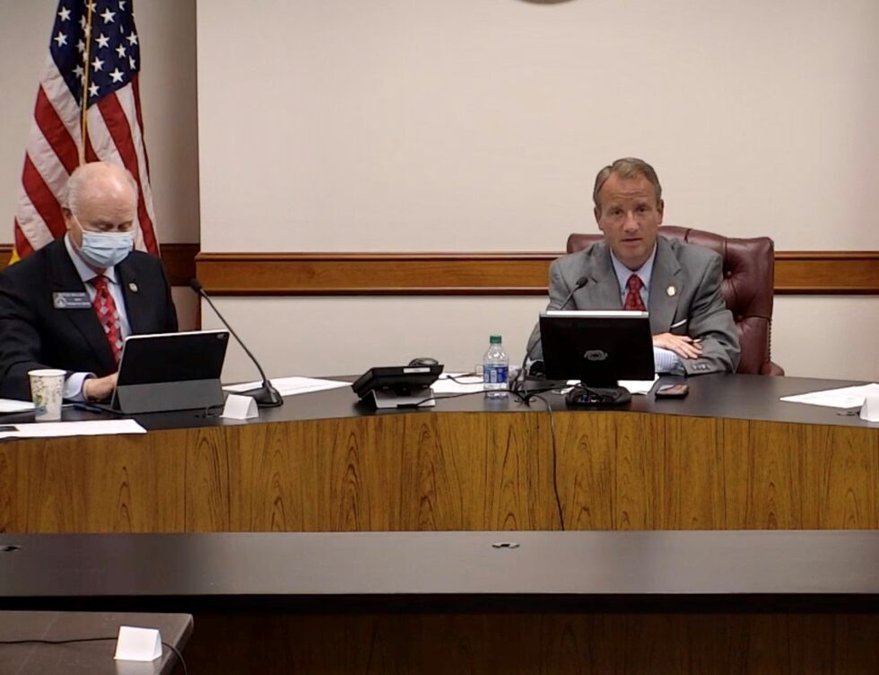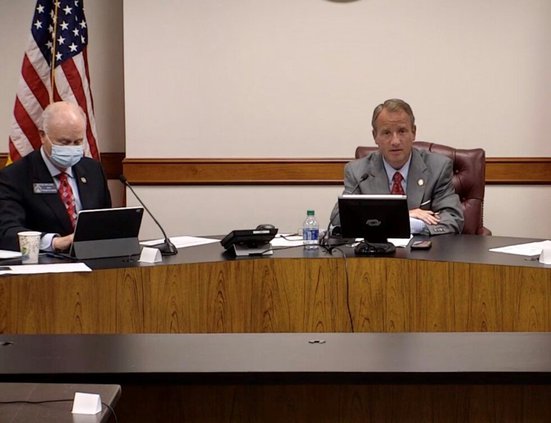By Beau Evans
Nearly 2,000 Georgia criminal offenders enrolled in programs that let them work jobs and finish their sentences outside prison could be headed back behind bars due to budget cuts prompted by the coronavirus pandemic, state lawmakers learned Wednesday.
Roughly $4.3 million would be cut from the state Criminal Justice Coordinating Council’s budget for local grants to accountability courts, a popular program created by then-Gov. Nathan Deal in 2013 offering alternative sentences to curb recidivism for thousands of Georgia inmates with mental illness or substance-abuse issues.
If implemented, the cuts would likely cause around 1,900 current participants in accountability courts across the state to return to local jails or prisons to complete their sentences, said Hall County Superior Court Chief Judge Kathlene Gosselin, who chairs the state Council of Accountability Court Judges.
Many of those participants are employed in restaurants, poultry plants and elsewhere and have continued working throughout the coronavirus pandemic, kept track of by program supervisors who are routinely informed of their progress via Zoom video meetings, Gosselin told state lawmakers Wednesday.
“Those people will likely end up either in local jails or prisons if they do not have an opportunity to do this,” Gosselin said at a meeting of the Senate Appropriations Criminal Justice and Public Safety Subcommittee.
In all, Gosselin said between eight and 12 of the alternative-sentencing programs would likely need to be shelved over lack of funding from the budget cuts. Local judicial circuits that receive grant funding for the programs would have to decide whether they can still maintain them with less money, she said.
Gosselin’s assessment came amid two weeks of General Assembly hearings on 14% spending cuts agencies across state government are being asked to make to offset the loss of tax revenues brought on by the pandemic-induced business lockdown.
Dozens of state agencies submitted proposals last week for budget reductions totaling about $3.5 billion for the 2021 fiscal year, which starts July 1. The proposals were requested by top budget-writing lawmakers in the General Assembly, who are poised to make passing the budget the top priority once the legislature reconvenes next month.
If passed as is, the 14% cuts would translate to furloughs and layoffs for teachers, social workers, prosecutors and more, according to a review of agency proposals released last week. That would help close Georgia’s expected $3 billion to $4 billion tax revenue shortfall, though critics have called for raising revenues rather than spending cuts.
A hallmark of state criminal justice reforms, the alternative-sentence accountability courts saw roughly 12,400 participants enrolled in 163 courts statewide last year, of which 9,440 were still enrolled at the start of 2020, according to the council.
The state pocketed roughly $38.2 million in fiscal 2017 from more than 1,700 graduates of the program who both saved the state money in reduced prison costs and paid state income taxes, according to a study from the University of Georgia’s Carl Vinson Institute of Government.
Senate President Pro Tempore Butch Miller, R-Gainesville, said Wednesday “painful cuts” to programs like accountability courts that aim to reduce overall prison costs are counterproductive.
“We all understand the concept that it costs us more tomorrow when we don’t spend it today,” Miller said. “The pot’s only so big and we’ve got to cut the slices.”
Lawmakers also got an overview Wednesday of proposed cuts for public-safety agencies overseeing prisons, state troopers, state investigators, parolees and juvenile offenders.
Several agencies like the Georgia Bureau of Investigation, the Department of Community Supervision and the Department of Public Safety are facing furlough days for staff. Others like the Department of Corrections have proposed closing certain facilities, including Autry State Prison in Pelham. Shutting down the South Georgia prison would save nearly $18 million, officials say.
Sen. John Albers, who chairs the subcommittee, said he wants lawmakers to focus next month on finding ways to help agencies reduce the need for furloughs. That would involve looking at whether some of the state’s lucrative tax credits and incentives could be reined in to free up more revenue for agency spending, Albers said.
“I hope that we can work very diligently in order to get folks back to full-time work,” said Albers, R-Roswell. “I think we have several ways to do that.”

